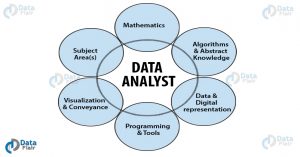How To Become Data Base Analyst

DATABASE ANALYST CAREERS
Every industrial organization depends on data to make business decisions such as developing innovative products, entering new markets, find new customers and make business investments with them. For these organizations, the database analysts are recruited to analyze how to use data to enable the organization to make essential decisions.
You are eligible for this job if you have a bachelor’s degree in computer science, information technology, or related field with strong knowledge and experience in newly launched statistical and software tools. You can make an average annual salary of approximately $60000 per annum while working for 8-10 office hours a day.
As a database analyst, your responsibility is to design and maintain database and data systems, data mining from various sources, using statistical software tools to explain the data sets, demonstrate their work in global trend to set competition, collaborating with various programs engineers and leaders to find more opportunities, and create appropriate documentation for stakeholders so that they can understand the data analysis process.
What Does a Database Analyst Do

Database Analysts organize and make sense of collections of information in order to create functional database systems. They evaluate, design, review, and implement databases. They are also hired to maintain and update existing databases to better serve the needs of businesses. Database Analysts may also play a role in the security of databases and assist in training employees on the proper use of databases.
Database Analysts perform a large part of their work independently, but they must confer regularly with management and Database Administrators to ensure they are collecting and organizing the information in the manner the business requires. The latest projections from the Bureau of Labor Statistics indicates that Database Administrators will see a job growth of 11 percent through 2024. This will create about 13,400 jobs during this period.
Responsibilities of a Data Analyst

The data analyst designation comes with a bunch of roles and responsibilities. And the first step to becoming a data analyst in understanding the responsibilities of one! Some of the common and expected responsibilities of a data analyst are:
1. Understanding the Goal
First and foremost, a data analyst must identify the organization’s goal. They must assess the available resources, comprehend the business problem, and collect the right data.
2. Querying
Data analysts write complex SQL queries and scripts to gather, store, manipulate, and retrieve information from relational databases such as MS SQL Server, Oracle DB, and MySQL.
3. Data Mining
Data is mined from a plethora of sources and organized to obtain new details from it. By doing so, data models are built to increase the efficiency of the system.
4. Data Cleansing
Cleaning and data wrangling is the vital duties of a data analyst. The data gathered initially will often be messy and have missing values. Hence, it’s crucial to clean the collected data to make it ready for the analysis purpose.
5. Data Examining
Data analysts use analytical and statistical tools, including programming languages, for carrying out a logical examination of data.
6. Interpreting Data Trends
Data analysts use various packages and libraries to spot trends and patterns from complex datasets, thereby discovering unseen business insights.
7. Preparing Summary Reports
Data analysts prepare summary reports with the help of data visualization tools. These reports guide the leadership team to make timely decisions.
8. Collaborating with Other Teams
Data analysts interact with the management team, development team, and data scientists to ensure proper implementation of business requirements and figure out process improvement opportunities.
And now that you’re well aware of the roles and responsibilities of a data analyst, you are ready to unlock the secret – how to become a data analyst.
What Industry Do Data Analyst Work?

The career path you take as a data analyst depends in large part on your employer. Data analysts work on Wall Street at big investment banks, hedge funds, and private equity firms. They also work in the healthcare industry, marketing, and retail. In general, data analysts are everywhere.
You can also find them at large insurance companies, credit bureaus, technology firms, and in almost any industry you can think of. Big tech companies such as Facebook and Google analyze big data to a dizzying degree. To do so, they employ many of the top data analysts for a variety of purposes including advertising and internal analysis along with a great deal of user analysis.
Data Analyst Qualifications

Graduating from a data analysis program, particularly if you have a strong grade point average and a high ranking in your class, should lead to an entry-level data analysis position without much trouble. Even a less-focused degree in mathematics, statistics, or economics from a reputable university is enough to get your foot in the door. Though the job is entry-level, the pay is more than seasoned professionals in most fields make.
As discussed, some of the top jobs in data analysis can reach as high $100,000 annually during the first year out of college. Experienced professionals can make double or more what an entry-level data analyst makes. Experience can come from working as an entry-level analyst or from a related field, such as investment analysis. However, education is often the most important thing on your resume when applying for a data analyst job. Few people get hired without strong academic performances in math-related fields of study.
How To Get A Job As A Data Analyst

Companies have access to more information than ever before in the form of data. But these mountains of data shrivel down to molehills without someone to make sense of all those numbers. This is where the data analyst swoops in to save the day! If you’re mathematically inclined and enjoy working with data, consider becoming a data analyst. You need to have strong mental math abilities and excellent communication skills to make it as a data analyst.
Data analysts make sense of the massive amount of information businesses have on their consumers and the market. By wielding strong statistical knowledge and epic database building, data analysts are able to identify trends, recognize problems with current strategies, and recommend a path forward.
As a data analyst, you crunch the numbers and translate complex trends into easily digestible information for others to use to improve the business model. You know exactly the right questions to ask to get the answers you’re looking for. Since all major companies now have so much information, data analysts are in high demand. Typically, you’ll work for large consumer-facing businesses, market research firms, or financial institutions.
AVERAGE SALARY FOR A DATABASE ANALYST

Data Analyst Career Paths

Below is a list of some of the many different roles that you may encounter when searching for or considering data analysis.
- Business Analyst: analyzes business specific data.
- Management Reporting: reports data analytics to management on business functions.
- Corporate Strategy Analyst: this type of role will focus on analyzing company wide data and advising management on strategy direction. This role may also be focused on mergers and acquisitions.
- Compensation And Benefits Analyst: usually part of a human resources department that analyzes employee compensation and benefits data.
- Budget Analyst: focuses on the analysis and reporting of a specified budget.
- Insurance Underwriting Analyst: analyzes individual, company, and industry data for decisions on insurance plans.
- Actuary: analyzes mortality, accident, sickness, disability, and retirement rates to create probability tables, risk forecasting, and liability planning for insurance companies.
- Sales Analytics: focuses on sales data that helps to support, improve, or optimize the sales process.
- Web Analytics: analyzes a dashboard of analytics around a specific page, topic focus, or website comprehensively.
- Fraud Analytics: monitors and analyzes fraud data.
- Credit Analytics: the credit market offers a wide need for analytics and information science in the areas of credit reporting, credit monitoring, lending risk, lending approvals, and lending analysis.
- Business Product Analyst: focuses on analyzing the attributes and characteristics of a product as well as responsibility for advising management on the optimal pricing of a product based on market factors.
- Social Media Data Analyst: social media and growing tech companies rely on data to build, monitor, and advance the technology and offerings that social media platforms rely on.
- Machine Learning Analyst: machine learning is a developing technology that involves programming and feeding machines to make cognitive decisions. Machine learning analysts may work on a variety of aspects including data preparation, data feeds, analysis of results, and more.







